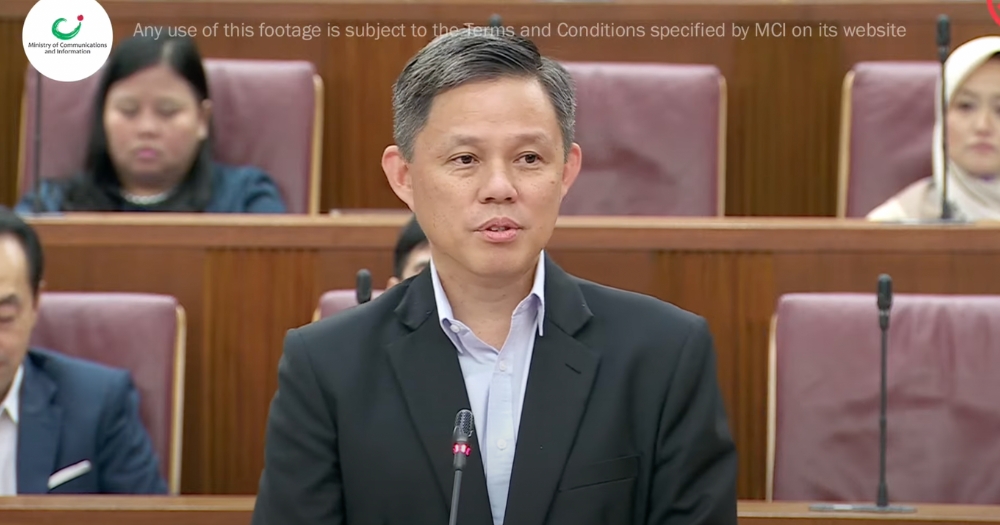Follow us on Telegram for the latest updates: https://t.me/mothershipsg
The Ministry of Education (MOE) unveiled the changes that it has in store for Singapore's education system during this year's Committee of Supply (COS) debates.
Following these announcements, several Members of Parliament (MPs) raised questions to seek further clarification from MOE, including Workers' Party (WP) MPs Jamus Lim and Louis Chua.
Lim: What is inhibiting WP's proposed through-train programme?
Lim said that he accepted Education Minister Chan Chun Sing's arguments that PSLE could offer an "important checkpoint" and allow parental choice when it comes to secondary school entry.
However, he also wondered about Chan's opinion that not allowing a child to not take the Primary School Leaving Examination (PSLE) is "another dimension of choice".
Lim sought clarifications on what are MOE's inhibitions behind the "optional through-train" programme.
"Does it have to do with resource constraints [...] or is it more with a perceived lack of demand, as you may have alluded to. If it is the latter, what would be the hurdles to piloting this for just a small number of schools to gauge take up," he asked.
The programme, which WP proposed sometime back in 2015, will allow Singapore students to bypass PSLE through a 10-year programme, starting from when a student is in primary one up till secondary four.
Chan walks through consideration process
In response to Lim's queries, Chan said that he'll "walk through the process".
These are the considerations the ministry took before considering WP's through-train programme proposal.
Who gets to go through the programme?
Chan explained that at primary one, it's "very difficult, if not, impossible" to know the abilities of the children.
"If the through-train programme [goes] to a very popular school — and you know which one I'm talking about — I'm sure there's no shortage of takers for this through-train programme. But what about those who develop a bit later and want the chance to go to some of these schools?"
Other concerns that may arise include:
- Does it mean, therefore, they don't get the chance to go to these schools?
- How does it affect social mixing?
What happens if a child is not suitable?
Chan gave another scenario where a parent decides for their child to go for the through-train programme.
However, sometime later the parent figures out that the child isn't suitable for the programme.
"Then what do I do?" Chan asked, portraying a parent in the scenario.
These are three other considerations that Chan talked about:
- If there are no checkpoints, how can they help the students to get into the right educational setting?
- How to cater to the diversity of learners?
- How to resource these schools with a "complete suite of programmes" for students that have been taken in at primary one?
MOE has considered, and is still considering, the through-train programme
Chan said the education ministry is "not ideologically close to all good ideas", adding that it has considered WP's proposal, and is still considering the through-train programme.
However, MOE has to "step through" all these "non-trivial" issues systematically to do so.
In an earlier speech at the MOE's COS, Mayor and MP Denise Phua had also urged MOE to allow for and support the blooming of alternate education school models.
Phua asked MOE to seriously study the potential of through-train schools without the PSLE.
Home-school distance cannot be a primary factor
On the other hand, Chua asked for further elaborations about the "societal circumstances and needs" in relation to the P1 registration framework.
Chua also asked whether home-school distance can be a primary deciding factor, while still keeping alumni and community privileges as a secondary criterion.
This is to "send the right signal" that distance and convenience for the children is the most important factor.
In response, Chan talked about the importance of community-based groups:
"When the country was young, community-based groups, alumni, they all play an important part and they still do in helping to foster a sense of community and spirit.
But as societies mature, there's always a risk that such groups become closed groups and exclusive groups. That's why over time, we must find that balance."
On home-school distance, Chan said MOE accepts that it is an important factor, for the convenience of both the students and parents.
However, the difficulty lies in balancing societal needs with circumstances such as home-school distance.
Additionally, home-school distance cannot be the only consideration during the P1 registration exercise as it will lead to "unintended consequences".
More MOE stories from the 2023 COS debates
Top image screenshot from Ministry of Communications and Information/YouTube
If you like what you read, follow us on Facebook, Instagram, Twitter and Telegram to get the latest updates.
